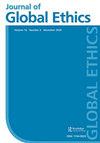Editorial
Q2 Arts and Humanities
引用次数: 0
Abstract
This issue of Journal of Global Ethics contains a collection of accepted articles from among our refereed submissions and a special section focused on a matter of continuing concern, the COVID-19 global emergency. We open with the refereed articles of three authors, two of whom focus on governance in the context of the business management paradigm that is called corporate social responsibility (CSR). CSR has been proposed as a model for self-regulation by the businesses themselves. It has been under some form of consideration since before Milton Friedman presented the familiar claim that ‘the social responsibility of business is to increase its profits... to make as much money as possible while conforming to the basic rules of the society, both those embodied in law and those embodied in ethical custom.’ CSR extends the claim on management’s responsibilities far beyond that limit, and it similarly makes a more expansive claim than a third familiar model, stakeholder theory, which requires management to consider those who are especially affected by a management decision. So, CSR is different in kind than both of these: it is intended to include as part of the corporate objective a regard for social purposes and social problems that businesses may alleviate through their activity. Businesses might be called upon to weigh the opportunity to reduce the opportunities for government corruption that would arise if they were to implement more costly accounting systems, for example. As different concerns have come under discussion, the specific responsibilities that are appropriate to consideration under a CSR approach have been a changing subject that extends into consideration of environmental concerns and wealth inequities especially in this century. CSR discourse is reconfigured within the two articles, presenting turns that are recent innovations in the business ethics literature, and that are generally unfamiliar within discussion of global ethics. Michael Aßländer, in ‘Subsidiarity, wicked problems and the matter of failing states’, and Juliette Schwak, in ‘Foreign aid and discourses of National Social Responsibility: evidence from South Korea’, both apply the approach of CSR to governance, rather than to business management, and each takes the conversation in a very different direction. Michael Aßländer applies concerns of social organization to business entities, extending the corporate objective to the ideal of a ‘corporate citoyen’/citizen. The ideal of subsidiarity is embodied in the principle that ‘societal tasks should be solved by subordinate entities in society if these entities have the competencies to solve such problems,’ and Aßländer hazards that the ideal may be applied to corporations as responsible problem-solvers. Aßländer continues a discussion begun in the pages of this journal by Tjidde Tempels, Vincent Blok, and Marcel Verweij in 2017 (13:1). Aßländer notes that ‘subsidiary responsibilities are often task-related and not always predefined by clearly classified competences,’ and considers the extreme case of failed states, which present conditions of compromised governance in which corporate citizens may even have a generative role in producing order. In this context and in others, the competitive characteristic of business activity may be applied: as Aßländer suggests, ‘actors having similar problems may test different solutions and, thus, compete with each other for the best solutions, which then can serve as models for other cases.’编辑
本期《全球伦理杂志》收录了我们提交的参考资料中的公认文章,并有一个特别章节关注持续关注的问题,即新冠肺炎全球紧急情况。我们从三位作者的参考文章开始,其中两位作者专注于企业社会责任(CSR)商业管理范式背景下的治理。企业社会责任已被提议作为企业自我监管的模式。在米尔顿·弗里德曼提出“企业的社会责任是增加利润。。。尽可能多地赚钱,同时遵守社会的基本规则,包括体现在法律和道德习俗中的规则企业社会责任将对管理层责任的主张远远超出了这一限制,它同样提出了比第三个熟悉的模型——利益相关者理论——更广泛的主张,该模型要求管理层考虑那些特别受管理决策影响的人。因此,企业社会责任在性质上与这两者不同:它旨在将企业通过其活动缓解的社会目的和社会问题作为企业目标的一部分。例如,如果企业实施成本更高的会计系统,可能会被要求权衡减少政府腐败机会的机会。随着不同问题的讨论,适合在企业社会责任方法下考虑的具体责任是一个不断变化的主题,特别是在本世纪,它延伸到了对环境问题和财富不平等的考虑。在这两篇文章中,企业社会责任话语被重新配置,呈现了商业伦理文献中最近的创新,以及在全球伦理讨论中通常不熟悉的转折。Michael Aßländer在《补贴、邪恶问题和失败国家的问题》和Juliette Schwak在《对外援助和国家社会责任的论述:来自韩国的证据》中都将企业社会责任的方法应用于治理,而不是企业管理,并且每个人都将对话引向了非常不同的方向。Michael Aßländer将社会组织的关注点应用于商业实体,将企业目标扩展到“企业公民”/公民的理想。辅助性的理想体现在“如果社会中的下属实体有能力解决这些问题,那么这些实体就应该解决这些社会任务”的原则中,以及该理想可以应用于作为负责任的问题解决者的公司的危险。Aßländer继续了Tjidde Tempels、Vincent Blok和Marcel Verweij于2017年(13:1)在本期刊页面上开始的讨论。Aßländer指出,“附属责任通常与任务相关,并不总是由明确分类的权限预先定义”,并考虑了失败国家的极端情况,这些国家存在治理受损的情况,在这种情况下,企业公民甚至可能在创造秩序中发挥生成作用。在这种情况下以及在其他情况下,商业活动的竞争特征可能会被应用:正如Aßländer所建议的,“有类似问题的参与者可能会测试不同的解决方案,从而相互竞争最佳解决方案,然后这些解决方案可以作为其他情况的模型。”
本文章由计算机程序翻译,如有差异,请以英文原文为准。
求助全文
约1分钟内获得全文
求助全文

 求助内容:
求助内容: 应助结果提醒方式:
应助结果提醒方式:


